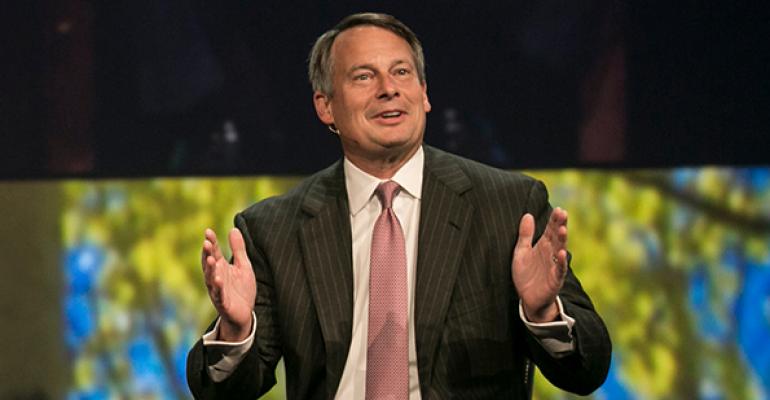Charles Schwab’s acquisition of TD Ameritrade will create a new titan in the financial services space, and some commentators were quick to suggest that the deal would be subject to antitrust scrutiny by the federal government.
In a conference call on Monday, Schwab CEO Walt Bettinger dismissed that idea, and said the combined company would have numerous competitors, and saw no problem working closely with regulators to close the deal by the end of next year.
“I think the issue here is less about antitrust,” he said during the call. “It’s more about just focusing on differentiating ourselves in a marketplace that is very diverse …helping more investors at a cost that is much lower than virtually anywhere else in the industry.”
Any antitrust investigations Schwab could face may emanate from concerns about its total market share of the RIA custody asset space, according to analysts.
Exact numbers vary, but by any measure a post-acquisition Schwab will be the dominant player in registered investment advisor custody. According to a note from Keefe, Bruyette & Woods analyst Kyle Voigt, Schwab holds about half of the market share of total RIA custody assets, while TD Ameritrade holds about 15% to 20%.
But in the Monday morning conference call, Bettinger dismissed the notion that RIA custody would spark antitrust concerns as "industry speculation." Schwab, he said, holds about 8% of the market share of the country's "retail investing market," including assets in the RIA channel. "With the combination of our two firms, that number goes up to 11%."
"I think that some folks are running away a little bit with some of these assumptions around percentage of the RIA custody market because they're only looking at a very narrow slice," he said. "They're looking at the purpose-built platforms when the reality is there's enormous assets that are managed by independent investment advisors that sit on non-purpose-built platforms. And when you factor that in, the percentage of market share that we have for overall RIA custody standalone or under the combined companies is a much more modest percent than some of the numbers I've seen thrown around in the press and some evaluations here."
But Voigt said the deal might “face somewhat significant antitrust hurdles, depending on how the competitive market is viewed by relevant authorities.” According to Tyler Gellasch, the executive director of Healthy Markets, there is already limited competition for custodying and trading for smaller and mid-size advisor assets, and any antitrust investigation initiated by the Department of Justice (DOJ) or the Securities and Exchange Commission (SEC) could analyze the acquisition through the lens of that market segment.
“Right now, a $500 million asset manager, as a trading entity, doesn’t have relationships with institutional trading desks at bulge bracket banks,” he said. “How will a manager without hundreds of billions in AUM buy research and trade for their customers, and how will they custody their assets? Schwab and TD Ameritrade are two of the leading firms in providing custody and trading services for smaller managers, and their combination will further limit managers’ options,” Gellasch said.
Michael Wong, Morningstar Research Services’ director of equity research and financial services for North America (and a Schwab analyst), agreed that antitrust challenges were unlikely, even in the context of RIA custody assets. While most of Schwab’s competitors in that space would be significantly smaller, they’re often affiliated with larger entities, Wong said.
Additionally, he said Schwab could make a defense similar to the one made for Amazon in the retail space; in both instances, he said, the costs for customers are decreasing.
“They can see (Amazon) as having a really big share in the retail market, but they’re bringing down prices. And that’s the opposite of what you’d see in people exercising monopolistic pricing power,” he said. “I think that’ll be one of the main arguments.”
According to Schwab, the deal will take six to eight months to complete, and its total integration is expected to take between 18 and 26 months. According to Schwab CFO Peter Crawford, the firm has already been in “preliminary discussions” with the Federal Reserve about the acquisition. An antitrust investigation could conceivably slow this process, but it is also unclear which agency would take the initiative should there be scrutiny. According to Gellasch, it’s possible (albeit unlikely) that the SEC could take the lead.
“Typically, when a merger happens in any industry, the DOJ gives weight to the primary regulators of that industry,” he said. “But the SEC has historically not weighed in heavily on antitrust.”
Gellasch noted that outgoing SEC Commissioner Robert J. Jackson Jr. spoke out about the SEC’s unheralded responsibility in ensuring competition in markets, calling it “the forgotten fourth pillar of the SEC’s mission” in a speech at an Open Markets Institute event in Oct. 2018. Still, Gellasch too said it was unlikely that any substantive antitrust investigation would be able to progress in Washington in the coming year, either in the DOJ or at the SEC.
“It wouldn’t surprise me to see some political rhetoric about it, but I just don’t think there’s enough of a consensus for the SEC to suddenly spring into action now,” he said.
“I think it’s likely we hear another round of concern about consolidation in the industry, and how this could lead to further consolidation and damage in the RIA world," he said. "I just don’t see regulators doing anything to stop it.”





